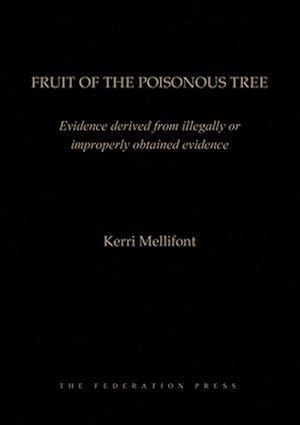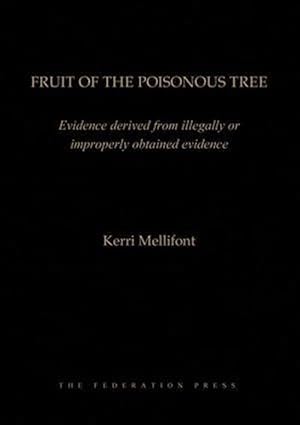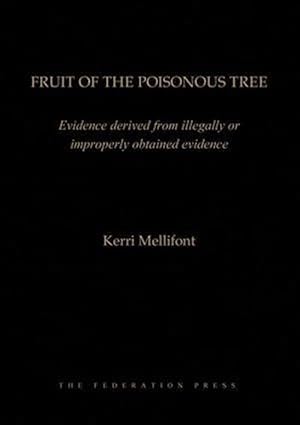Mellifont Kerri (3 results)
Product Type
- All Product Types
- Books (3)
- Magazines & Periodicals
- Comics
- Sheet Music
- Art, Prints & Posters
- Photographs
- Maps
-
Manuscripts &
Paper Collectibles
Condition
- All Conditions
- New
- Used
Binding
- All Bindings
- Hardcover
- Softcover
Collectible Attributes
- First Edition
- Signed
- Dust Jacket
- Seller-Supplied Images
- Not Printed On Demand
Free Shipping
Seller Location
Seller Rating
-
Fruit of the Poisonous Tree (Hardcover)
Published by Federation Press, Annandale, NSW, 2010
ISBN 10: 1862877335ISBN 13: 9781862877337
Seller: Grand Eagle Retail, Wilmington, DE, U.S.A.
Book
Hardcover. Condition: new. Hardcover. The importance of derivative evidence and the way that courts treat its admissibility cannot be underestimated. In many cases, the determination of whether or not derivative evidence will be admitted has the functional effect of deciding the outcome of a trial. \nM Wiseman, The Derivative Imperative: An Analysis of Derivative Evidence in Canada (1997) 39 Criminal Law Quarterly 435, 491.\nThe fate of a criminal trial can be determined by a decision by the trial judge to exclude evidence which has come about by illegal or improper investigative means. An exclusion of a confession obtained involuntarily, or drugs located in an illegal search, can result in the collapse of a case against an accused.\n\nAlthough much has been written in Australia on the rule and discretions to exclude such evidence, little has been written on a particular species of such evidence, that is, evidence which is derived from evidence which has been obtained by illegal or improper investigative means. This is so even though a criminal law practitioner is not infrequently faced with a brief of evidence which contains evidence which has been derived from other evidence which itself was illegally or improperly obtained.\n\nDescribed variously in overseas literature as derivative evidence or fruit of the poisonous tree, this species of evidence gives rise to considerations which are peculiar to it when applying the exclusionary rule and discretions. Thus, the second or subsequent confession obtained after in consequence of an improperly obtained confession may require the judge to think differently on the question of exclusion. Similarly, the bank records located in consequence of scraps of paper found during an illegal search of an accused persons residence may call into play additional factors to weigh in the balance required by the public policy discretion.\n\nThis text provides practitioners with a readily comprehensible analysis of the operation of the exclusionary rule and discretions in Australia, including the factors which come in to play generally with respect to all evidence illegally and improperly obtained, and more specifically with respect to derivative evidence. A readily comprehensible analysis of the operation of the exclusionary rule and discretions in Australia, including the factors which come into play generally with respect to all evidence illegally and improperly obtained, and more specifically with respect to derivative evidence. Shipping may be from multiple locations in the US or from the UK, depending on stock availability.
-
Fruit of the Poisonous Tree (Hardcover)
Published by Federation Press, Annandale, NSW, 2010
ISBN 10: 1862877335ISBN 13: 9781862877337
Seller: AussieBookSeller, Truganina, VIC, Australia
Book
Hardcover. Condition: new. Hardcover. The importance of derivative evidence and the way that courts treat its admissibility cannot be underestimated. In many cases, the determination of whether or not derivative evidence will be admitted has the functional effect of deciding the outcome of a trial. \nM Wiseman, The Derivative Imperative: An Analysis of Derivative Evidence in Canada (1997) 39 Criminal Law Quarterly 435, 491.\nThe fate of a criminal trial can be determined by a decision by the trial judge to exclude evidence which has come about by illegal or improper investigative means. An exclusion of a confession obtained involuntarily, or drugs located in an illegal search, can result in the collapse of a case against an accused.\n\nAlthough much has been written in Australia on the rule and discretions to exclude such evidence, little has been written on a particular species of such evidence, that is, evidence which is derived from evidence which has been obtained by illegal or improper investigative means. This is so even though a criminal law practitioner is not infrequently faced with a brief of evidence which contains evidence which has been derived from other evidence which itself was illegally or improperly obtained.\n\nDescribed variously in overseas literature as derivative evidence or fruit of the poisonous tree, this species of evidence gives rise to considerations which are peculiar to it when applying the exclusionary rule and discretions. Thus, the second or subsequent confession obtained after in consequence of an improperly obtained confession may require the judge to think differently on the question of exclusion. Similarly, the bank records located in consequence of scraps of paper found during an illegal search of an accused persons residence may call into play additional factors to weigh in the balance required by the public policy discretion.\n\nThis text provides practitioners with a readily comprehensible analysis of the operation of the exclusionary rule and discretions in Australia, including the factors which come in to play generally with respect to all evidence illegally and improperly obtained, and more specifically with respect to derivative evidence. A readily comprehensible analysis of the operation of the exclusionary rule and discretions in Australia, including the factors which come into play generally with respect to all evidence illegally and improperly obtained, and more specifically with respect to derivative evidence. Shipping may be from our Sydney, NSW warehouse or from our UK or US warehouse, depending on stock availability.
-
Fruit of the Poisonous Tree (Hardcover)
Published by Federation Press, Annandale, NSW, 2010
ISBN 10: 1862877335ISBN 13: 9781862877337
Seller: CitiRetail, Stevenage, United Kingdom
Book
Hardcover. Condition: new. Hardcover. The importance of derivative evidence and the way that courts treat its admissibility cannot be underestimated. In many cases, the determination of whether or not derivative evidence will be admitted has the functional effect of deciding the outcome of a trial. \nM Wiseman, The Derivative Imperative: An Analysis of Derivative Evidence in Canada (1997) 39 Criminal Law Quarterly 435, 491.\nThe fate of a criminal trial can be determined by a decision by the trial judge to exclude evidence which has come about by illegal or improper investigative means. An exclusion of a confession obtained involuntarily, or drugs located in an illegal search, can result in the collapse of a case against an accused.\n\nAlthough much has been written in Australia on the rule and discretions to exclude such evidence, little has been written on a particular species of such evidence, that is, evidence which is derived from evidence which has been obtained by illegal or improper investigative means. This is so even though a criminal law practitioner is not infrequently faced with a brief of evidence which contains evidence which has been derived from other evidence which itself was illegally or improperly obtained.\n\nDescribed variously in overseas literature as derivative evidence or fruit of the poisonous tree, this species of evidence gives rise to considerations which are peculiar to it when applying the exclusionary rule and discretions. Thus, the second or subsequent confession obtained after in consequence of an improperly obtained confession may require the judge to think differently on the question of exclusion. Similarly, the bank records located in consequence of scraps of paper found during an illegal search of an accused persons residence may call into play additional factors to weigh in the balance required by the public policy discretion.\n\nThis text provides practitioners with a readily comprehensible analysis of the operation of the exclusionary rule and discretions in Australia, including the factors which come in to play generally with respect to all evidence illegally and improperly obtained, and more specifically with respect to derivative evidence. A readily comprehensible analysis of the operation of the exclusionary rule and discretions in Australia, including the factors which come into play generally with respect to all evidence illegally and improperly obtained, and more specifically with respect to derivative evidence. Shipping may be from our UK warehouse or from our Australian or US warehouses, depending on stock availability.




